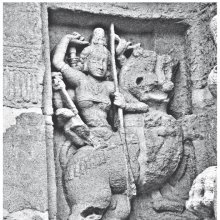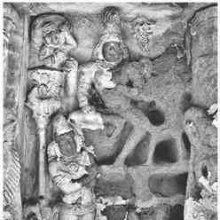Shur, Śur, Śūr, Sūr: 9 definitions
Introduction:
Shur means something in Hinduism, Sanskrit, Hindi, biology. If you want to know the exact meaning, history, etymology or English translation of this term then check out the descriptions on this page. Add your comment or reference to a book if you want to contribute to this summary article.
The Sanskrit terms Śur and Śūr can be transliterated into English as Sur or Shur, using the IAST transliteration scheme (?).
Images (photo gallery)
Biology (plants and animals)
Source: Google Books: CRC World Dictionary (Regional names)Shur in India is the name of a plant defined with Saccharum bengalense in various botanical sources. This page contains potential references in Ayurveda, modern medicine, and other folk traditions or local practices It has the synonym Erianthus procerus (Roxb.) Raizada (among others).
Example references for further research on medicinal uses or toxicity (see latin names for full list):
· Contributions from the United States National Herbarium (2003)
· Proc. 14th Congr. Int. Soc. Sugar Cane Technologists (1972)
· Observationes Botanicae (1789)
· Flora Indica; or descriptions … (1820)
· Archief voor de Suikerindustrie in Nederland en Nederlandsch-Indië (1925)
· Journal of Cytology and Genetics (1990)
If you are looking for specific details regarding Shur, for example side effects, chemical composition, pregnancy safety, health benefits, diet and recipes, extract dosage, have a look at these references.

This sections includes definitions from the five kingdoms of living things: Animals, Plants, Fungi, Protists and Monera. It will include both the official binomial nomenclature (scientific names usually in Latin) as well as regional spellings and variants.
Languages of India and abroad
Sanskrit dictionary
Source: DDSA: The practical Sanskrit-English dictionaryŚur (शुर्) or Śūr (शूर्).—4 Ā. (śūryate)
1) To hurt, kill.
2) To make firm or steady, stop.
3) To be firm or fixed.
4) To be senseless, to faint.
--- OR ---
Śūr (शूर्).—I. 4 Ā. To hurt, injure, kill; शुशूरेऽरिशिरः शरैः (śuśūre'riśiraḥ śaraiḥ) Śiśupālavadha 19.18. -II. 1 U. (śūrayati-te)
1) To act the hero, be powerful.
2) To make vigorous extertions; see शुर् (śur) also.
--- OR ---
Sur (सुर्).—I. 6 P. (surati)
1) To rule, govern.
2) To shine. -II. 1 P. = स्वर् (svar) q. v.
--- OR ---
Sūr (सूर्).—4 Ā. (sūryate)
1) To hurt, kill.
2) To make firm or be firm.
Source: Cologne Digital Sanskrit Dictionaries: Shabda-Sagara Sanskrit-English DictionaryŚur (शुर्).—[(ī)śurī] r. 4th cl. (śūryate) 1. To hurt, to kill. 2. To make firm. 3. To be stupid or insensible; also śūra .
--- OR ---
Śūr (शूर्).—[śūra] r. 10th cl. (śūrayati-te) 1. To be valiant or powerful, to act the hero. 2. To make great effort or exertion. (ī) śūrī r. 4th cl. (śūryate) 1. To hurt or kill. 2. To be stupid.
--- OR ---
Ṣur (षुर्).—r. 6th cl. (surati) 1. To possess supreme or superhuman power. 2. To shine.
--- OR ---
Ṣūr (षूर्).—[(ī)ṣūrī] r. 4th cl. (sūryate) 1. To be stopped or fixed. 2. To hurt or kill.
--- OR ---
Sur (सुर्).—r. 6th cl. (surati) 1. To possess superhuman power. 2. To shine; also ṣura .
--- OR ---
Sūr (सूर्).—[(ī) sūrī] r. 4th cl. (sūryate) 1. To hurt or kill. 2. To be stupid or dull. 3. To make firm.
Source: Cologne Digital Sanskrit Dictionaries: Benfey Sanskrit-English DictionaryŚūr (शूर्).—sūr SŪR, i. 4, [Ātmanepada.] 1. To hurt or kill. 2. To be firm. i. 10 (rather a [denominative.] derived from the next), [Ātmanepada.] 1. To be valiant. 2. To make great exertion. visūrita, see s. v.
--- OR ---
Sur (सुर्).—i. 6, [Parasmaipada.] 1. To possess superhuman power. 2. To shine.
--- OR ---
Sūr (सूर्).—see śūr.
Source: Cologne Digital Sanskrit Dictionaries: Monier-Williams Sanskrit-English Dictionary1) Śūr (शूर्):—(also written sūr) [class] 4. [Ātmanepada] ([Dhātupāṭha xxvi, 48]) śūryate, to hurt, injure, kill (only in [perfect tense] śuśūre, ‘he cut off [the head]’ [Śiśupāla-vadha xix, 108]);
—to be or make firm, [Dhātupāṭha; ib.];
— [class] 10. [Ātmanepada] to be powerful or valiant (in this sense rather [Nominal verb] [from] next), [Dhātupāṭha xxxv, 48.]
2) Sūr (सूर्):—a (also written śūr) [class] 4. [Ātmanepada] ([Dhātupāṭha xxvi, 48]) śūryate, to hurt, injure, kill (only in [perfect tense] śuśūre, ‘he cut off [the head]’ [Śiśupāla-vadha xix, 108]);
2) —to be or make firm, [Dhātupāṭha; ib.];
2) — [class] 10. [Ātmanepada] to be powerful or valiant (in this sense rather [Nominal verb] [from] next), [Dhātupāṭha xxxv, 48.]
3) Sur (सुर्):—(rather [Nominal verb] [from] sura below) [class] 6. [Parasmaipada] surati, to rule, possess supreme or superhuman power, [Dhātupāṭha xxviii, 50];
—to shine, [ib.];
— [class] 10. [Parasmaipada] surayati, to find fault ([varia lectio] for svar), [xxxv, 11].
4) Sūr (सूर्):—1. sūr etc. See √śūr, p. 1086, col. 1.
5) 2. sūr weak form of 2. svar q.v.
Source: Cologne Digital Sanskrit Dictionaries: Yates Sanskrit-English Dictionary1) Śur (शुर्):—(ya, ī, ṅa) śūryyate 4. d. To hurt; to be stupid or insensible.
2) Śūr (शूर्):—(ka, ṅa) śūrayarta 10. d. To be valiant or strenuous. (ya, ī) śūryyate 4. d. To hurt; to be stupid.
3) Ṣur (षुर्):—surati 6. a. To be supreme; to shine.
4) Ṣūr (षूर्):—(ya, ī, ṅga) sūryyate 4. d. To be stopped; hurt.
[Sanskrit to German]
Sanskrit, also spelled संस्कृतम् (saṃskṛtam), is an ancient language of India commonly seen as the grandmother of the Indo-European language family (even English!). Closely allied with Prakrit and Pali, Sanskrit is more exhaustive in both grammar and terms and has the most extensive collection of literature in the world, greatly surpassing its sister-languages Greek and Latin.
Hindi dictionary
Source: DDSA: A practical Hindi-English dictionary1) Shur in Hindi refers in English to:—(a and nm) valiant, brave, heroic, gallant, mighty, valorous (man); a hero; warrior; ~[ta/tva] heroism, valour, bravery, gallantry; ~[mmanya] one who thinks himself a hero; -[vira] brave and valorous, hero, valiant; ~[sena] mediaeval name of the territory lying in and around Mathura:..—shur (शूर) is alternatively transliterated as Śūra.
2) Sur in Hindi refers in English to:—(nm) tone; a note in music; vowel; a god; ~[gana] gods, the whole body of gods; -[tana] tone and tune; •[mem karana] to attune; ~[tva] godhood; ~[dara] melodious, harmonious; ~[dhama] the abode of gods; •[sidharana] to leave for one’s heavenly abode—to die; -[bhamga] see [svarabhamga; ~raja] king of gods—Indra; ~[lahari] musical wave, melody; ~[sarita] the river Ganga:; —[milana] to attune, to harmonise; —[mem sura milana] to chime in..—sur (सुर) is alternatively transliterated as Sura.
3) Sur in Hindi refers in English to:—(a) brave; blind; (nm) the sun; ~[dasa] (euphemistically) a blind person; •[kari kamari pai cadhai na dujo ramga] can the Ethiopian change his colour!, black will take no other hue..—sur (सूर) is alternatively transliterated as Sūra.
...
Kannada-English dictionary
Source: Alar: Kannada-English corpusSūr (ಸೂರ್):—[noun] = ಸೂರು [suru]2.
Kannada is a Dravidian language (as opposed to the Indo-European language family) mainly spoken in the southwestern region of India.
See also (Relevant definitions)
Starts with (+119): Shura-virata, Shurabala, Shurabhogeshvara, Shurabhu, Shurabhumi, Shuradanta, Shuradatta, Shuraditya, Shuragrama, Shurajima, Shuraka, Shurakita, Shurakuta, Shurali, Shuramanin, Shuramanojna, Shuramatha, Shuramgama, Shuramgamasamadhinirdesha, Shuramgamasamadhisutra.
Ends with: Ashur, Cakshur, Gaukshur, Gokshur, Gyashur, Jal-indushur, Kashur, Kshur, Nishur, Oshur, Poshur, Vyavalokanacakshur.
Full-text (+928): Surana, Nishur, Surapaga, Suracarya, Surasuta, Shuraka, Surakrit, Suraja, Shuravarman, Suradasa, Saurparakiya, Sura, Svar, Shurapura, Soparaka, Gaa, Ikuwu, Kooman, Lifofa, Voliman.
Relevant text
Search found 45 books and stories containing Shur, Śur, Śūr, Sur, Sūr, Ṣur, Ṣūr; (plurals include: Shurs, Śurs, Śūrs, Surs, Sūrs, Ṣurs, Ṣūrs). You can also click to the full overview containing English textual excerpts. Below are direct links for the most relevant articles:
Rig Veda (translation and commentary) (by H. H. Wilson)
Tibet (Myth, Religion and History) (by Tsewang Gyalpo Arya)
4. How Zhangzhung came under Tibet < [Chapter 2 - Zhangzhung Civilization]
Manusmriti with the Commentary of Medhatithi (by Ganganatha Jha)
Verse 1.17 < [Section IX - Creation of the World from ‘Mahat’ downwards]
Ever with Man < [July – September, 1989]
Remembering Gandhi < [July – September, 2000]
Jules Supervielle (1884-1960) < [April 1969]
Folk Tradition of Bengal (and Rabindranath Tagore) (by Joydeep Mukherjee)
Maha Prajnaparamita Sastra (by Gelongma Karma Migme Chödrön)
The formless absorptions (ārūpyasamāpatti) according to the Mahāyāna < [Class 4: The four formless absorptions]
The world of transmigration < [Chapter XXVII - The Virtue of Exertion]
Second part: the morality of pledge (samādānaśila) < [Chapter XXII - The Nature of Morality]
Related products



